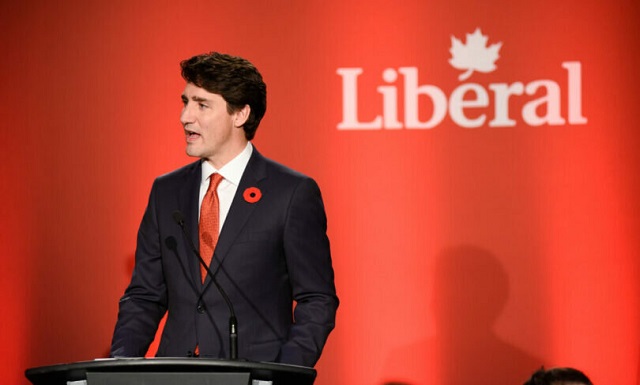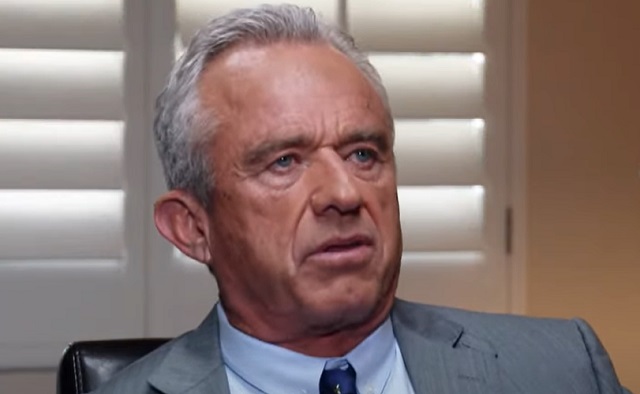Business
Western societies must stop the spread of Marxism

From the Fraser Institute
The point is not to improve, it’s to destroy. Think of any tradition or institution that has thus far escaped attention from woke radicals and make a note. Within a year you will learn it too is under siege.
Recently in this paper, Jordan Peterson diagnosed the psychological grip woke activists have on ordinary people, urging conservatives to move beyond the slogan “It’s the economy, stupid” and start fighting the philosophical battles at hand. I would argue the economic and philosophical problems originated in the same place—the seminal text of political economy, which became the handbook for bad economics and the woke movement alike. Put simply, it’s the political economy, stupid.
I speak of The Communist Manifesto by Karl Marx and Friedrich Engels. Published in 1888 it opens with the simplistic declaration: “The history of all hitherto existing society is the history of class struggles. Freeman and slave, patrician and plebeian, lord and serf, guild-master and journeyman, in a word, oppressor and oppressed.” In the rigid oppressor/oppressed scheme, which is the heart of woke ideology, everyone is either tyrant or victim, not based on one’s choices but by the accident of historical circumstances. If you are an oppressor, you can never be anything else.
And, most ominously, everything that’s contributed to historical oppression, including all customary civil rights and social institutions, must be destroyed and replaced with a new centrally-planned society. According to Marx and Engels, “the theory of the Communists may be summed up in the single sentence: Abolition of private property.” To abolish private ownership is to abolish all individuality, replacing it with uniform group identity under the control of a totalitarian state.
And they didn’t stop there. They called for abolition of all forms of free buying and selling, all rights of inheritance, family structures, religion, private industry, parental control over education, etc. They called for the centralization of banking, industry, agriculture, all means of communication and all forms of transportation into the hands of “the State,” by which they meant themselves and their allies. “In short, the Communists everywhere support every revolutionary movement against the existing social and political order of things,” they declared. “They openly declare that their ends can be attained only by the forcible overthrow of all existing social conditions.” (emphasis added)
It was through this tortured logic that Marx and Engels convinced their followers to gain power through force, strip people of their rights and impose brutal totalitarianism. After all, what we call “civil rights” and “personal freedoms” were merely the means by which oppressors have historically exercised power. Neither Marx nor Engels nor their allies asked whether their cure might be worse than the disease. Having declared that society is nothing but oppressors exploiting the oppressed, and having declared themselves the true Advocates for the oppressed, they were duty-bound to destroy society and impose what they called “communism,” an empty word that turned out to mean nothing more than them and their fellow lunatics taking charge.
Once you understand that every institution on which society has hitherto rested, down to motherhood and milk, is a target for overthrow, today’s woke revolution makes sense. The point is not to improve, it’s to destroy. Think of any tradition or institution that has thus far escaped attention from woke radicals and make a note. Within a year you will learn it too is under siege.
The 20th century taught us that Marxist theory is false and toxic, but once it takes root it spreads quickly, including in places where people believed “it couldn’t happen here.” From 1945 until the collapse of the Soviet Union in 1990 at least half the world lived under Marxist dictatorships. Why would such an odious doctrine become popular in so many societies? How can it be stopped once it begins to spread? After the fall of communism, we in the West stopped asking those questions, and forgot how to answer them.
Marxist doctrine spreads because the “oppressed” gain instant status and power without the need for personal virtues or accomplishments. The idea holds appeal, but only to our most selfish and cruel instincts. The oppressed become exempt from criticism, and come to believe they’re entitled to take everything the so-called oppressors have, by force if necessary, or to burn the whole system down for revenge.
The only remedy for this cult-like mindset, what Elon Musk called the “woke mind virus,” is to teach people a healthy and proper loathing of victim status. The young must be taught old-fashioned values of self-reliance and individual accountability. Coddled adults who embrace cultural Marxism and its seductive promise of victim status might eventually tire of its grim nihilism, but until they do they must not be allowed to exploit or misappropriate the compassion decent people feel towards genuine victims of oppression.
Peterson is right that the underlying battles are philosophical and psychological. Many people will only become engaged when cultural Marxism begins to destroy the economy, as eventually it must. Anyone who wants to prevent another outbreak of the political and psychological horrors of the Maoist and Soviet empires must recognize the lateness of the hour and equip themselves accordingly.
Author:
Automotive
The EV ‘Bloodbath’ Arrives Early

 From the Daily Caller News Foundation
From the Daily Caller News Foundation
By David Blackmon
Ever since March 16, when presidential candidate Donald Trump created a controversy by predicting President Joe Biden’s efforts to force Americans to convert their lives to electric-vehicle (EV) lifestyles would end in a “bloodbath” for the U.S. auto industry, the industry’s own disastrous results have consistently proven him accurate.
The latest example came this week when Ford Motor Company reported that it had somehow managed to lose $132,000 per unit sold during Q1 2024 in its Model e EV division. The disastrous first quarter results follow the equally disastrous results for 2023, when the company said it lost $4.7 billion in Model e for the full 12-month period.
While the company has remained profitable overall thanks to strong demand for its legacy internal combustion SUV, pickup, and heavy vehicle models, the string of major losses in its EV line led the company to announce a shift in strategic vision in early April. Ford CEO Jim Farley said then that the company would delay the introduction of additional planned all-electric models and scale back production of current models like the F-150 Lightning pickup while refocusing efforts on introducing new hybrid models across its business line.
General Motors reported it had good overall Q1 results, but they were based on strong sales of its gas-powered SUV and truck models, not its EVs. GM is so gun-shy about reporting EV-specific results that it doesn’t break them out in its quarterly reports, so there is no way of knowing what the real bottom line amounts to from that part of the business. This is possibly a practice Ford should consider adopting.
After reporting its own disappointing Q1 results in which adjusted earnings collapsed by 48% and deliveries dropped by 20% from the previous quarter, Tesla announced it is laying off 10 percent of its global workforce, including 2,688 employees at its Austin plant, where its vaunted Cybertruck is manufactured. Since its introduction in November, the Cybertruck has been beset by buyer complaints ranging from breakdowns within minutes after taking delivery, to its $3,000 camping tent feature failing to deploy, to an incident in which one buyer complained his vehicle shut down for 5 hours after he failed to put the truck in “carwash mode” before running it through a local car wash.
Meanwhile, international auto rental company Hertz is now fire selling its own fleet of Teslas and other EV models in its efforts to salvage a little final value from what is turning out to be a disastrous EV gamble. In a giant fit of green virtue-signaling, the company invested whole hog into the Biden subsidy program in 2021 with a mass purchase of as many as 100,000 Teslas and 50,000 Polestar models, only to find that customer demand for renting electric cars was as tepid as demand to buy them outright. For its troubles, Hertz reported it had lost $392 million during Q1, attributing $195 million of the loss to its EV struggles. Hertz’s share price plummeted by about 20% on April 25, and was down by 55% for the year.
If all this financial carnage does not yet constitute a “bloodbath” for the U.S. EV sector, it is difficult to imagine what would. But wait: It really isn’t all that hard to imagine at all, is it? When he used that term back in March, Trump was referring not just to the ruinous Biden subsidy program, but also to plans by China to establish an EV-manufacturing beachhead in Mexico, from which it would be able to flood the U.S. market with its cheap but high-quality electric models. That would definitely cause an already disastrous domestic EV market to get even worse, wouldn’t it?
The bottom line here is that it is becoming obvious even to ardent EV fans that US consumer demand for EVs has reached a peak long before the industry and government expected it would.
It’s a bit of a perfect storm, one that rent-seeking company executives and obliging policymakers brought upon themselves. Given that this outcome was highly predictable, with so many warning that it was in fact inevitable, a reckoning from investors and corporate boards and voters will soon come due. It could become a bloodbath of its own, and perhaps it should.
David Blackmon is an energy writer and consultant based in Texas. He spent 40 years in the oil and gas business, where he specialized in public policy and communications.
Business
Honda deal latest episode of corporate welfare in Ontario

From the Fraser Institute
By Jake Fuss and Tegan Hill
If Honda, Volkswagen and Stellantis are unwilling to build their EV battery plants in Ontario without corporate welfare, that sends a strong signal that those projects make little economic sense.
On Thursday, the Trudeau and Ford governments announced they will dole out an estimated $5 billion in corporate welfare to Honda so the auto giant can build an electric vehicle (EV) battery plant and manufacture EVs in Ontario. This is the third such deal in Ontario, following similar corporate welfare handouts to Volkswagen ($13.2 billion) and Stellantis ($15.0 billion). Like the previous two deals, the Honda deal comes at a significant cost to taxpayers and will almost certainly fail to create widespread economic benefits for Ontarians.
The Trudeau and Ford governments finalized the Honda deal after more than a year of negotiations, with both governments promising direct incentives and tax credits. Of course, this isn’t free money. Taxpayers in Ontario and the rest of Canada will pay for this corporate welfare through their taxes.
Unfortunately, corporate welfare is nothing new. Governments in Canada have a long history of picking their favoured firms or industries and using a wide range of subsidies and other incentives to benefit those firms or industries selected for preferential treatment.
According to a recent study, the federal government spent $84.6 billion (adjusted for inflation) on business subsidies from 2007 to 2019 (the last pre-COVID year). Over the same period, provincial and local governments spent another $302.9 billion on business subsidies for their favoured firms and industries. (Notably, the study excludes other forms of government support such as loan guarantees, direct investments and regulatory privileges, so the total cost of corporate welfare during this period is actually much higher.)
Of course, when announcing the Honda deal, the Trudeau and Ford governments attempted to sell this latest example of corporate welfare as a way to create jobs. In reality, however, there’s little to no empirical evidence that corporate welfare creates jobs (on net) or produces widespread economic benefits.
Instead, these governments are simply picking winners and losers, shifting jobs and investment away from other firms and industries and circumventing the preferences of consumers and investors. If Honda, Volkswagen and Stellantis are unwilling to build their EV battery plants in Ontario without corporate welfare, that sends a strong signal that those projects make little economic sense.
Unfortunately, the Trudeau and Ford governments believe they know better than investors and entrepreneurs, so they’re using taxpayer money to allocate scarce resources—including labour—to their favoured projects and industries. Again, corporate welfare actually hinders economic growth, which Ontario and Canada desperately need, and often fails to produce jobs that would not otherwise have been created, while also requiring financial support from taxpayers.
It’s only a matter of time before other automakers ask for similar handouts from Ontario and the federal government. Indeed, after Volkswagen secured billions in federal subsidies, Stellantis stopped construction of an EV battery plant in Windsor until it received similar subsidies from the Trudeau government. Call it copycat corporate welfare.
Government handouts to corporations do not pave the path to economic success in Canada. To help foster widespread prosperity, governments should help create an environment where all businesses can succeed, rather than picking winners and losers on the backs of taxpayers.
Authors:
-

 COVID-192 days ago
COVID-192 days agoPfizer reportedly withheld presence of cancer-linked DNA in COVID jabs from FDA, Health Canada
-

 COVID-191 day ago
COVID-191 day agoTrudeau gov’t has paid out over $500k to employees denied COVID vaccine mandate exemptions
-

 National1 day ago
National1 day agoAnger towards Trudeau government reaches new high among Canadians: poll
-

 International1 day ago
International1 day agoRFK Jr tells EWTN: Politicization of the CIA, FBI, Secret Service under Biden is ‘very troubling’
-

 Brownstone Institute2 days ago
Brownstone Institute2 days agoThe Teams Are Set for World War III
-

 Addictions1 day ago
Addictions1 day agoWhy can’t we just say no?
-

 Opinion2 days ago
Opinion2 days agoThe Climate-Alarmist Movement Has A Big PR Problem On Its Hands
-

 Alberta2 days ago
Alberta2 days agoFormer senior financial advisor charged with embezzling millions from Red Deer area residents










